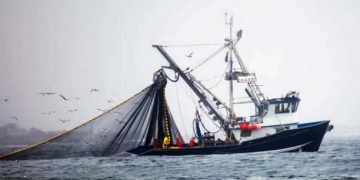Most countries engage in redundant two-way seafood trade, with the majority of trade involving five key partners and nearly half of it concerning only four species.
Over the past two centuries, international trade has significantly impacted the global economy. Ensuring sustainable trade practices is crucial for achieving sustainable development goals at both national and international levels. Sustainable trade generates economic value, alleviates poverty, reduces inequality, and promotes the conservation and reuse of environmental resources.
Seafood is a vital component of global nutrition and one of the most traded food commodities. While efforts to improve seafood sustainability have mainly concentrated on production methods such as aquaculture and fishing, less attention has been given to the sustainability of seafood trade itself, a crucial link in the supply chain. Seafood trade can have various negative environmental and social impacts, including greenhouse gas emissions and the spread of invasive species through transportation. This trade can displace environmental impacts far from the consumption site, complicating their traceability and management.
Reducing redundant two-way seafood trade, where the same type and quantity of seafood are exchanged between two countries, could streamline this trade. While socioeconomic and ecological factors such as seasonality, management restrictions, and financial incentives contribute to redundant trade, minimizing it could yield social and environmental benefits. However, data deficiencies in global seafood trade currently limit detailed exploration of these redundancies.
A study summarized from the original publication (Kuempel C.D. et al., 2024, “Quantifying Global Redundant Fisheries Trade to Streamline Seafood Supply Chains,” PLoS ONE 19(7): e0305779) presents findings on the volume, extent, trade partners, and species involved in redundant trade practices, using the best available data as a first step towards understanding potential sustainability gains.
Study Setup The study utilized a global seafood trade database that estimates the annual volume of seafood imports by each country and its origin. This dataset identifies whether the export product was produced through aquaculture or wild capture fisheries and categorizes re-exports. The dataset, with its extensive time series of trade data, provided a robust basis for analysis. However, aquaculture records and re-exported trades were excluded to reduce uncertainty and double counting, and only data identifiable to the species level were considered.
Results and Discussion The results indicated that most countries participated in redundant two-way trade within the global seafood trade network. Factors influencing this trade include taste preferences, profit maximization, trade agreements, and resource availability. Despite the small proportion of global seafood trade accounted for by redundant trade (2.6 to 4.6 percent annually), its reduction could yield several benefits. For instance, shortening supply chains by keeping goods within producing countries could reduce environmental impacts like greenhouse gas emissions and the spread of pests.
For intercontinental trade partners such as Ecuador and Spain or China and Russia, retaining wild-caught fisheries production locally could lower carbon emissions from freight, which currently contributes to 7 percent of global emissions and is projected to increase significantly by 2050. Reducing redundant trade could also improve traceability and impact accounting, reducing the displacement of environmental and socioeconomic impacts.
The study found that nearly 70 percent of redundant trade occurred between ten countries, primarily within Europe and North America, driven by regional free trade agreements and strong political and economic ties. This suggests that a focus on environmental sustainability within these regions’ seafood trade policies could set a global precedent for sustainable trade.
The study also highlighted the need for finer resolution data to understand the drivers of redundant trade better. Further research should include aquaculture trade and consider seasonal variations, processing stages, and trade networks.
Perspectives Consumer preferences significantly impact seafood trade, with demand for specific types, parts, or preservation methods driving redundant trade. For instance, countries often export high-value seafood products and import lower-value ones. The study accounted for variations by analyzing only the same taxonomic species, excluding re-exports and aquaculture products. Future research should build on these findings to explore the social, environmental, and economic costs of redundant trade and the potential benefits of reducing it.
Globalization and technological advancements have increased seafood trade since the 1970s, bringing economic and social benefits but also inefficiencies with negative environmental and social outcomes. Redundant trade, though a small proportion of total seafood trade, has been increasing and represents a potential leverage point for sustainable trade. Understanding and addressing redundant trade is essential for meeting global sustainable development goals.
Discover in-depth supply chain report news insights at The Supply Chain Report. For international trade tools, see ADAMftd.com.
#SeafoodTrade #FisheriesSupplyChain #SustainableSeafood #GlobalTrade #SupplyChainNews













